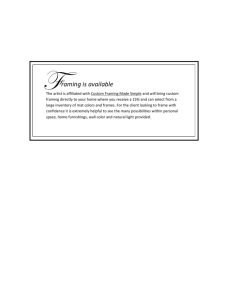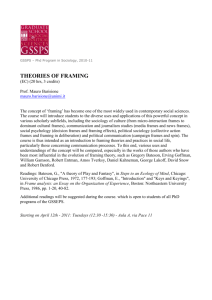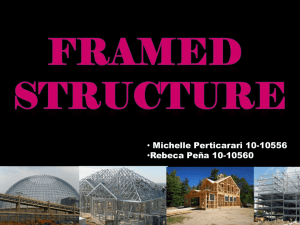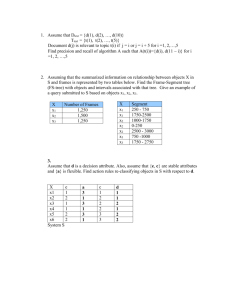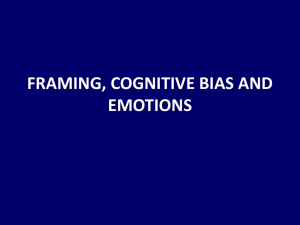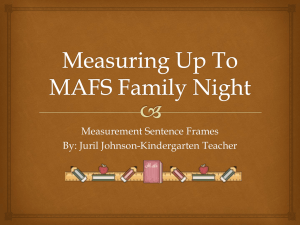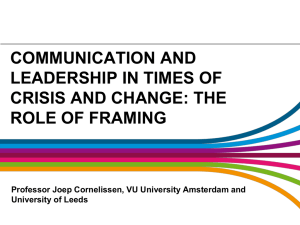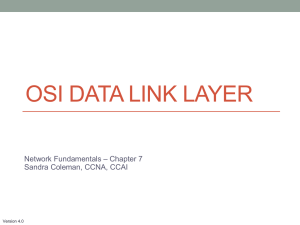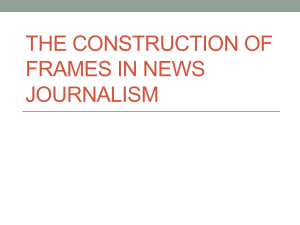Framing
advertisement
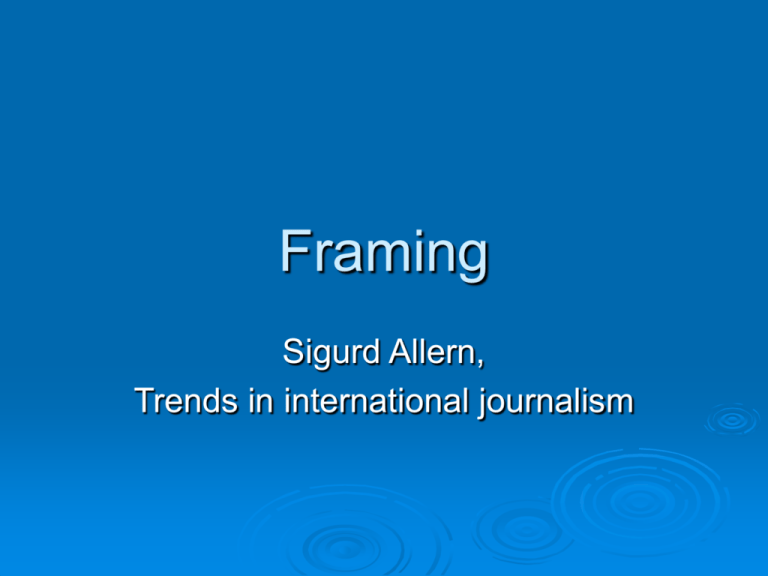
Framing Sigurd Allern, Trends in international journalism News as frame News is a window of the world. Through its frame, American learn of themselves and others, of their institutions, leaders, and life styles, and those of other nations and their peoples… But, like any frame that delineates a world, the news frame may be considered problematic. The view through a window depends upon whether the window is large or small, has many panes or few, whether the glass is opaque or clear, whether the window faces a street or a backyard. (Gaye Tuchman, Making News, 1980) Defining framing “Frames are organizing principles that are socially shared and persistent over time, that work symbolically to meaningfully structure the social world” (Stephen D. Reese (2001: 11) in Reese, Gandy & Grant (eds.): Framing Public Life, L. Erlbaum Associates, New Jersey/London) “To frame is to select some aspects of a perceived reality and make them more salient in a communicating text” (Robert Entman 1993: 52) “The frame suggests what the controversy is about, the essence of the issue” (Gamson & Modigliani 1989, in Vreese: 27) Defining framing (2) Frames are..”persistent patterns of cognition, interpretation, and presentation, of selection, emphasis and exclusion by which symbolhandlers routinely organize discourse” (Gitlin 1980: 7) Frames are ..interpretative packages that give meaning to an issue (Gamson & Modigliani, 1989: 3) Journalistic tools in framing the news Choosing the news angle Selecting the sources Formulating the headline of the story Summing up the main point of the story Choosing the right picture How was the news item introduced? Headline or prefatory statement by reporter or anchor? What expectations did the introduction create about the story? What other introduction could appropriately have been used? How would other introductions have reframed the report? Was there a summary statement at the end of the report? What interpretation, if any, did it impose on the report? (Jamieson & Campbell: 115) Frame-building Frame-building are factors internal and external to journalism that determine how journalists and news organizations frame issues. Internal factors are to an example journalistic news values, market strategies and organizational constraints.The frame building process takes place in a continuous interaction between journalists and elites and social movements. The outcomes of the frame-building process are the frames manifest in the text (Vreese 2003: 24, 43) Frame-setting Frame-setting refers to the interaction between media frames and individual’s prior knowledge and predispositions. Frames in the news may affect interpretation, learning, and evaluation of issues and events. The consequences of framesetting can be considered both on the individual and societal level (Vreese 2003: 24-25) Generic news frames Generic news frames are general and not confined to a specific issue. Examples: ‘Horse race frame’ (Politics as a ‘game’ with winners and losers) ‘Episodic’ and ‘thematic’ news frames (Iyengar 1991) Conflict frame Economic consequence frame Responsibility frame Morality frame Issue-specific news frames Media frames in specific news stories: The war in Iraq (‘occupation frame’ versus ‘war against terrorism-frame’) Closing of industrial plants : ‘economic necessity frame’ versus ‘social responsibility/employment frame’ Predator policy: ‘Environmental protect the wolf & bear frame’ versus ‘protect the farm animals frame’ Framing contests If political actors are to succeed in getting their frames wholly or partly presented in the media, they have to adhere to certain news conventions and genre demands from news organisations giving priority to conflicts, power struggles and drama which can be personalized. Often politicians will try to avoid “negative news”. When factions in a political party are competing for the leadership, it will be of vital importance to influence how this power struggle is presented and commented in the news. News frames (like focusing on the elements of conflict) are therefore supplemented by more political frames (defining the problems and proposing solutions) which are negotiated between political actors and news organisations. A strong emphasis on conflict The study shows that when European issues are covered in the news this often happens with a strong emphasis on conflict. This presence of the conflict frame suggests that the considerations made by journalists when choosing events and issues for the news are translated into how these are presented in the news. Emphasizing the conflict may justify the publication of a news story above and beyond its news value and at the same time provides journalists with a clear conception of how to package and present the news. (Vreese: 164) ”What is the Norwegian interest in this” During our days of observation at the NRK Dagsrevyen the political news editor, Kyrre Nakkim, said, “When working with EU topics we often follow the reports from the Swedish Broadcasting Corporation (SVT), and ask ourselves: what is the Norwegian interest in this?” The standard requirement of framing EU issues in a national context is also looked upon by some interviewees as a limitation. The most important professional challenge is “to combine a focus on Norwegian cases and Norwegian special interests with an understanding of the broader picture and the longer trajectories of development in Europe,” said the foreign news editor at Aftenposten, Per Kristian Haugen. The importance of a national angle The importance of a national angle can be interpreted in more ideological terms as a type of traditional nationalism. However, we think the most important element here is the market and audience orientations of the news organisations, a trait common to most news media all over the world. “How does this affect us, what are the consequences for our area and our daily lives?” are standard questions that the news media try to answer. Geographical, cultural and political proximity represent an informal, standard ‘market contract’ between news organisations and both their audiences and their advertisers. An European framing? A broader, pan-European perspective of course also exists, but only as a supplement to the dominant national framing. A constructed ‘European framing’ will, in our opinion, only be typical for European news media that either have an international audience or are newspapers read by elite groups participating in some of the more exclusive ‘public spheres’ of the EU. The news organisations are of course independent actors that in different ways influence the political and cultural developments in their countries. At the same time they are mediators, channels of communication and arenas for debate, normally communicating in a language specific to one or more nation states. Their role as part of a ‘European public sphere’ will always have this limitation.
